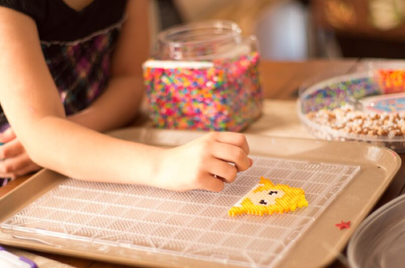 Have you ever said "yes" because you were afraid of being seen as uncooperative, of hurting people’s feelings, of getting others into trouble with their bosses, of missing opportunities? Saying "yes" when you mean "no" robs you of an irreplaceable resource: your time. Refusing someone’s request is easier than you think. And, it gives you the space to agree when something is important to you. Writer Leslie Jamison used to be afraid to say no. Ultimately, she kept a notebook of all the things to which she automatically said “uh-uh”…and she learned 4 important lessons:
When was the last time you said “no”, and were you glad you did? To join the conversation, click "comments" on below. Learn more about creating a habit around masterful communication with our online learning courses awarded International Gold for Best Hybrid Learning of 2022.
2 Comments
 Everyday anxiety is something we all experience from time to time. But new research suggests there is a simple way to mitigate it: perform a small act of kindness. How can paying for a stranger’s bagel or taking in your neighbor’s trash reduce anxiety? Researchers at Ohio State University conducted a head-to-head test of anti-anxiety interventions. Over five weeks, volunteers were asked to do one of three things a few times each week: plan an enjoyable social activity, write about their challenging thoughts, or perform random acts of kindness. After the experiment, all three groups felt less depressed and anxious. But the group that benefited the most, and that showed a higher level of satisfaction with life overall, was the group that deliberately acted kindly. Writing in Inc., contributing editor Jessica Stillman points out the many advantages of this approach to anxiety management for busy managers and entrepreneurs. For one thing, it is easily put into action (no waiting for a therapist’s appointment or an opportunity to meditate alone). You can compliment a co-worker or offer someone your seat on public transportation easily. Kindness can also have a ripple effect. Doing something nice for someone might well inspire them to “pay it forward” and enhance your entire workplace or community. When was the last time you performed a random act of kindness and how did it affect your mood? To join the conversation, click "comments" above. Learn more about creating a habit around masterful communication with our online learning courses awarded International Gold for Best Hybrid Learning of 2022.
 Have you performed a random act of kindness lately? In a study published in the Journal d Experimental Psychology, researchers found that when you perform a random act of kindness it’s easy to underestimate how much the recipient will appreciate it. And that miscalculation holds many of us back from doing nice things for others more often. We know that kindness can boost well-being, writes New York Times reporter Catherine Pearson. But researchers who study the subject hope these new findings will strengthen the scientific case for making these types of gestures more often. “I have found that kindness can be a really hard sell,” said Tara Cousineau, a clinical psychologist, meditation teacher and author of The Kindness Cure: How The Science of Compassion Can Heal Your Heart and Your World. "People desire kindness yet often feel inconvenienced by the thought of being kind.” On the other hand, even the smallest gestures do get noticed. So if you are not already in the habit of performing random kind acts — or they do not come naturally to you — begin by telling people what you appreciate about them. Also consider what you like to do, what skills and talents you have, and how you might turn those into small offerings for other people. How did you feel the last time you performed a small act of kindness, and how did you feel the last time someone did this for you? To join the conversation, click "comments" above. Learn more about creating a habit around masterful communication with our online learning courses awarded International Gold for Best Hybrid Learning of 2022.  Perhaps the only thing more stressful than being a teen—facing high stakes academics, social media pressures, peer competition, and more—is being the parent of one. Meltdowns can be common – even for the most well-meaning parents. (Tweet it!) Writing in The New York Times, Lisa Damour, a clinical psychologist and author of Untangled: Guiding Teenage Girls Through the Seven Transitions Into Adulthood, shared a technique she learned while chatting with the counseling team at a Dallas girls’ school. A counselor showed Damour a clear jam jar. Its lid was glued on and it was filled with water plus a layer of sparkling purple glitter on the bottom. “When a girl falls apart in my office, I do this,” she said, while shaking the jar fiercely, like an airport snow globe…”After that I say to her, ‘Honey, this is your brain right now. So first … let’s settle your glitter.’” Damour calls this “an elegant model of the neurology of the distressed teenager.” Early in adolescence, the brain begins upgrading itself to become more powerful and efficient. “The primitive regions, which are just above the back of the neck and house the emotion centers, are upgraded first — starting as early as age 10. The more sophisticated regions, located behind the forehead and giving us our ability to reason and maintain perspective, are redone last and may not reach full maturity until age 25.” During this process, young people, when upset, can be overcome, crashing the entire system until it has a chance to reboot. Damour has enthusiastically recommended glitter jars to several parents and colleagues, knowing that some teenagers will instantly benefit from having a concrete model of emotional distress. Even more important, she says, she has “come to appreciate that a glitter jar’s main utility is in the instructions it provides to those who are caring for the overwrought: Be patient and communicate your confidence that emotions almost always rise, swirl, and settle all by themselves.” Have you parented a teen, or known one well? If so, what do you think of the glitter jar approach? To join the conversation, click "comments" above. If you would like to learn more about creating a habit around masterful communication, check out our online learning programs.  When researchers surveyed almost 2,000 American girls, they found that the confidence levels of girls falls about 30 percent between the ages of 8 and 14 (https://nyti.ms/2RGgtZW). Since personal confidence can have profound outcomes for people of any age and gender, it’s important to consider ways to boost it. (Tweet it!) Speaking to The New York Times (https://nyti.ms/2RObV3u), tennis star and entrepreneur Venus Williams, who credits self-confidence as crucial to her success in many endeavors, offered three essential actions to magnify self-assurance.
“We all face challenges at some point in our lives,” says Williams, “but making a decision based on low self-esteem is a short-term play…The more we learn to make decisions based on self-confidence the more we are empowered to keep striving for our dreams.” Do you have a strategy you use for boosting self-confidence? In what situations does it work best? To join the conversation, click "comments" above. If you would like to learn more about creating a habit around masterful communication, check out our online learning programs.  The quality of child-parent relations is critical not just for emotional bonding, but also for learning of all types. (Tweet it!) So problems arise, says Erika Christakis, author of The Importance of Being Little, “when the emotionally resonant adult–child cueing system so essential to early learning is interrupted—by a text or a quick check-in on Instagram (https://bit.ly/2KsE7sm).” In one experiment that tested the impact of parental cellphone use on children’s language learning, thirty-eight mothers and their 2-year-olds were brought into a room. The mothers were told that they would need to teach their children two new words (blicking, which was to mean “bouncing,” and frepping, which was to mean “shaking”) and were given a phone so that investigators could contact them from another room. When the mothers were interrupted by a call, the children did not learn the word, but otherwise they did. Other experiments have shown similar results. Occasional parental inattention is not catastrophic, says Christakis, “…but chronic distraction is another story. Smartphone use has been associated with a familiar sign of addiction: Distracted adults grow irritable when their phone use is interrupted; they not only miss emotional cues but actually misread them.” Fixing the problem won't be easy, but Christakis offers a piece of good news: children are prewired to get what they need from adults, and young children will do a lot to get a distracted adult’s attention. Meanwhile, her advice: “Parents should give themselves permission to back off from the suffocating pressure to be all things to all people. Ditch that soccer-game appearance if you feel like it. Your kid will be fine. But when you are with your child, put down your damned phone.” What do you do when both your child and your phone are competing for your attention? To join the conversation, click "comments" above. If you would like to learn more about creating a habit around masterful communication, check out our online learning programs.  Most people have yelled at their kids—and doing so to keep them from running into traffic is perfectly understandable. (Tweet it!) But it’s ineffective if you’re doing it to correct a behavior like throwing clothes on the floor or procrastinating on homework. In fact, it “merely imprints the habit of yelling onto the children.” So says Stephen Marche, author and parenting podcaster. Writing in The New York Times, Marche cites a 2014 study in The Journal of Child Development, which demonstrates that yelling produces results similar to physical punishment in children: increased levels of anxiety, stress and depression along with an increase in behavioral problems. Since “yelling…is the response of a person who doesn’t know what else to do,” Marche recommends an alternative: the ABC technique of Alan Kazdin, professor of psychology and child psychiatry at Yale.
The purpose of Kazdin’s ABC’s is to build habits by actually changing the brain. And, as a positive side effect, family relations improve overall. Have you ever been brought to yelling at your kids? How could you use the ABC’s instead? To join the conversation, click "comments" above. If you would like to read more about creating a habit around masterful communication, check out our book: Be Quiet, Be Heard: The Paradox of Persuasion  The Boy Who Cried Wolf and Pinocchio are not what we think of as kids’ role models. But if your child is lying to you, research suggests that it’s not only normal, but a probable sign of intelligence. (http://nyti.ms/2mdN4bJ). Children discover lying at about age two, and they often become quite adept at the skill. When adults were shown footage of kids who were either lying or being truthful about committing a transgression, none of the adults (not even the kids’ parents) could consistently detect the lies. Some children start lying earlier than others and, according to developmental psychologist Michael Lewis, the precocious liars are smarter—by as much as 10 IQ points. Lewis suggests that the children who lie may have better “executive functioning skills” (faculties that enable us to control impulses and remain focused) as well as a heightened ability to see the world through other people’s eyes. The psychologist Kang Lee, who has researched deception in children for over two decades, tells parents that if they discover their child lying at age 2 or 3, they can cheer. Of course, parents ideally want their kids to be clever enough to lie but morally disinclined to do it. Good news: Simply getting children to pledge to tell the truth can increase their honesty (Tweet it!) Have you noticed your child fibbing to you? What has been your reaction, and do you think it might change when you consider that it could be a sign of intelligence? To join the conversation, click "comments" above. If you would like to read more about creating a habit around masterful communication, check out our book: Be Quiet, Be Heard: The Paradox of Persuasion  Parents want their kids to be successful, but much of the advice we give them can be counterproductive (http://bit.ly/2uVGjOS) says Emma Seppala, Science Director of Stanford University’s Center for Compassion and Altruism Research and Education. Seppala discovered some useful suggestions in researching her book, The Happiness Track:
What do you typically say to kids in your life to help them be happy, successful, and resilient? Has it had the desired effect? To join the conversation, click "comments" above. If you would like to read more about creating a habit around masterful communication, check out our book: Be Quiet, Be Heard: The Paradox of Persuasion  If you are a parent or have a child in your life, you have probably found yourself offering advice and reinforcement: “Be careful,” “Button your coat,” “Share!” – and when they eat their vegetables or achieve a milestone: “Good job.” What if these comments are more about adult control than actual child learning? (Tweet it!) Jennifer Lehr, author of the new book Parentspeak: What’s Wrong with How we Speak to our Children—and What to Say Instead, says it’s better to be a wingman, someone who has their child’s back and, in so doing, models appropriate interactions. For example, if someone gives their child a gift, a parent often defaults to saying something like, “Can you say thank you?” Using the wingman approach, the parent might say something like, “Thank you, Aunt Sue, for giving Maggie such a beautiful sweater.” Much of the time, the child will join in and mirror the parent’s thank you — and consequently hardwire the response on their own. Have you ever tried the wingman approach? What did you notice? To join the conversation, click "comments" on our Community of Practice Forum. If you would like to read more about creating a habit around masterful communication, check out our book: Be Quiet, Be Heard: The Paradox of Persuasion.  It’s hard to see a child unhappy. That’s why adults often rush in to offer immediate relief. But as psychologist Susan David, author of Emotional Agility, points out, this doesn’t help children in the long run. When teachers help preschoolers manage emotions in the classroom, those children become better problem solvers when faced with emotional situations, and are better able to engage in learning. In teenagers, “emotional intelligence”—the ability to recognize and manage emotions—is associated with greater self-esteem and ability to manage stress. Dr. David offers four steps for helping a child go through, rather than around, a negative emotion and emerge ready to move on:
We want to hear: What do you do when a child is having difficulty grappling with an emotion? To join the conversation, click "comments" on our Community of Practice Forum. If you would like to read more about creating a habit around masterful communication, check out our book: Be Quiet, Be Heard: The Paradox of Persuasion  If you have ever had a teenager in your life, you are doubtless familiar with the “eye roll.” The exaggerated skyward glance is an especially common response to well-meaning advice such as, “Take a jacket. It’s cold outside.” Parents and teachers may be offended by eye rolling, but perhaps they shouldn’t be. As Lisa Damour, psychologist and clinical instructor at Case Western Reserve University, writes in The New York Times, “Eye-rolling serves a variety of purposes, and the meanings behind the mannerism tell us a lot about what it’s like to be a teenager.” According to Damour, adolescents hate being told what to do, and will reflexively resist suggestions -- even when they agree! They may take that jacket you suggested, but not without asserting their budding sense of autonomy with an eye roll. Or take a situation where an adult lays down the law and the teenager sees no point in fighting back, but still feels compelled to broadcast an objection. “Again,” says Damour, “ophthalmic calisthenics offer a useful solution.” Eye rolls can also be employed when adults embarrass kids or have irrational expectations. Sure, they can be used dismissively or mockingly at times—but before adults over-react, they should consider that “more often than not, teenage eye-rolling serves as an efficient solution to the typical challenges posed by adolescence. And it presents adults with a choice: We can take the behavior personally, or we can try to see things from the teenage perspective.” We want to hear: Is there a teen in your life who frequently rolls eyes at you? What have your best responses been? Do you recall doing this as a teenager? To join the conversation, click "comments" on our Community of Practice Forum. If you would like to read more about creating a habit around masterful communication, check out our book: Be Quiet, Be Heard: The Paradox of Persuasion.  Are failures opportunities to grow, or negative experiences that impede success? A study reported by NPR confirms that how parents answer that question has a profound impact on how much children think they can improve their intelligence through hard work. "Parents are a really critical force in child development when you think about how motivation and mindsets develop," says Kyla Haimovitz a Stanford psychology professor who coauthored the study with colleague Carol Dweck. "Parents have this powerful effect really early on and throughout childhood to send messages about what is failure, how to respond to it." Evidence shows that when children view their abilities as more pliable--something they can change over time—they deal with obstacles more constructively, but communicating that message to children is not always simple. The bottom line: “When your child is struggling on something or has setbacks, don't focus on their abilities, focus on what they can learn from it," Haimovitz says. One way, she says, is to ask a child: "How can you use this as a jumping-off point?” We want to hear: Do you recall the messages your parents gave you about failure? How have they affected you? And how do you deal with it when your own children are frustrated by a lack of success in any given area? To join the conversation, click "comments" on our Community of Practice Forum. If you would like to read more about creating a habit around masterful communication, check out our book: Be Quiet, Be Heard: The Paradox of Persuasion.  Ignoring your kids in favor of your cell phone? Research shows what your gut may already tell you: It hurts their feelings. In researching her book The Big Disconnect: Protecting Childhood and Family Relationships in the Digital Age, psychologist Catherine Steiner-Adair interviewed 1,000 children between the ages of 4 and 18 about their parents' use of mobile devices. The language that came up over and over again was "sad, mad, angry and lonely." Some gleefully shared how they tossed a parent's phone into the toilet or hid it in the oven. If you’d like to preserve your cell phone—and possibly your family relationships—we recommend setting an intention to pay attention to your kids when you’re together. We agree with Steiner-Adair when she says, "We are behaving in ways that certainly tell children they don't matter, they're not interesting to us, they're not as compelling as anybody, anything, any ping that may interrupt our time with them.” Small wonder that children (and spouses and friends and colleagues…) may act out more to get a crumb of our attention. We want to hear from you: Have you experienced “disconnects” because you’re preoccupied with technology? Have you felt the ping of disrespect when someone chooses a cell phone over you? Do you have any solutions? To join the conversation, click "comments" on our Community of Practice Forum. If you would like to read more about creating a habit around masterful communication, check out our book: Be Quiet, Be Heard: The Paradox of Persuasion.  Sports have a lot to teach us about many things—including the best way to offer praise. Speaking on NPR, L. Jon Wertheim, executive editor of Sports Illustrated, and Tufts psychologist Sam Sommers, the authors of This is Your Brain On Sports, weighed in on the subject. Both authors happen to coach their kids’ sports teams, and both are opposed to the “everyone gets a participation trophy” style of recognition. Citing a study in which University of Notre Dame researchers tested praise's efficacy on a losing college hockey team, Wertheim and Sommers contend that the more specific praise is, the greater its impact. “Praise the hustle, the effort, the process,” they advise, and avoid generic praise like “good job” or “you’re smart.” (The hockey team, whose players were specifically complimented on the number of times they checked an opponent, made it into the playoffs). Whether dealing with children, or adults on organizational teams, the lesson applies universally. Be specific in your praise, compliment the level of effort, and notice the details of achievement. The results breed far more self-confidence than a generic “good job participation trophy”—and praiseworthy efforts are likely to continue. We want to hear: What’s a piece of memorable praise that you’ve received? What’s an example of high impact praise that you’ve given? To join the conversation, click "comments" on our Community of Practice Forum. If you would like to read more about creating a habit around masterful communication, check out our book: Be Quiet, Be Heard: The Paradox of Persuasion. |
Archives
July 2024
Categories
All
|
|
Glaser & Associates, Inc.
Executive Offices 1740 Craigmont Avenue, Eugene, OR 97405 541-343-7575 | 800-980-0321 [email protected] |
© 2019 Glaser & Associates. All Rights Reserved.


 RSS Feed
RSS Feed